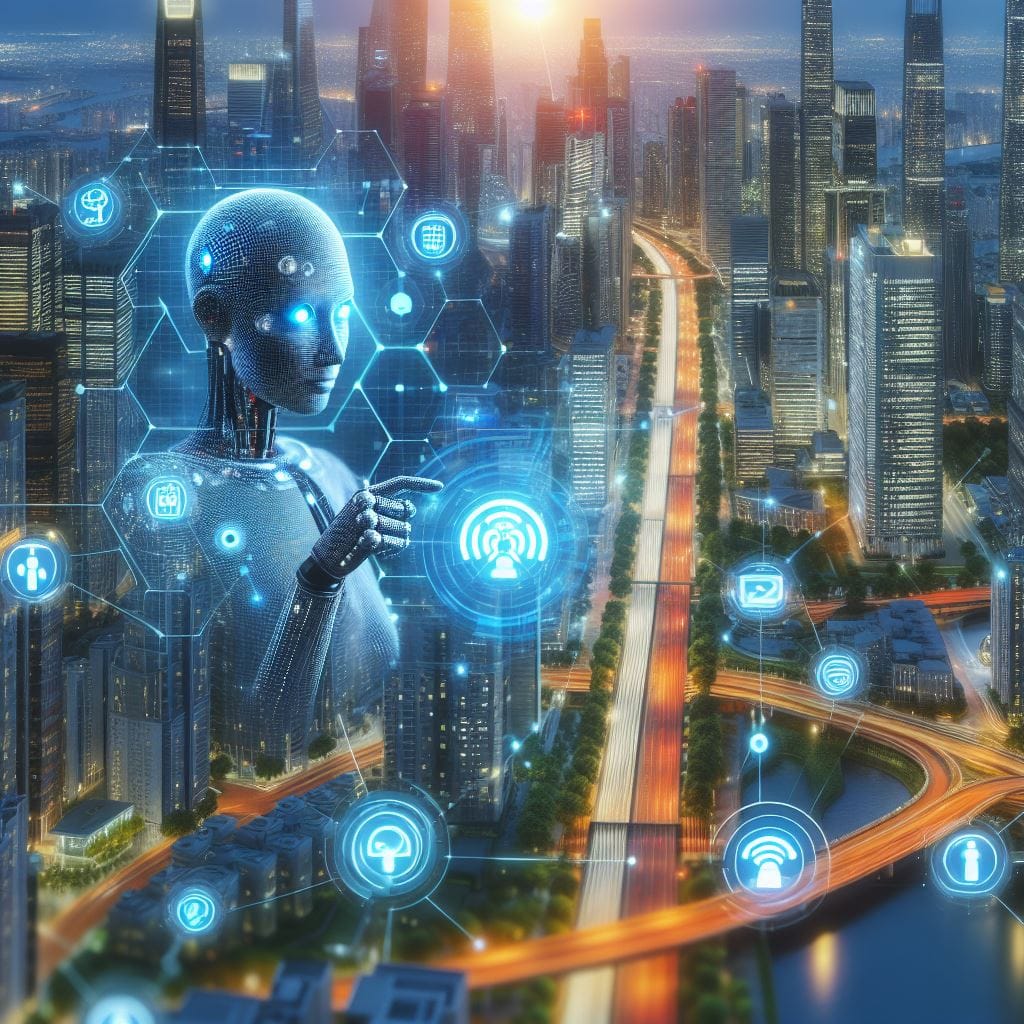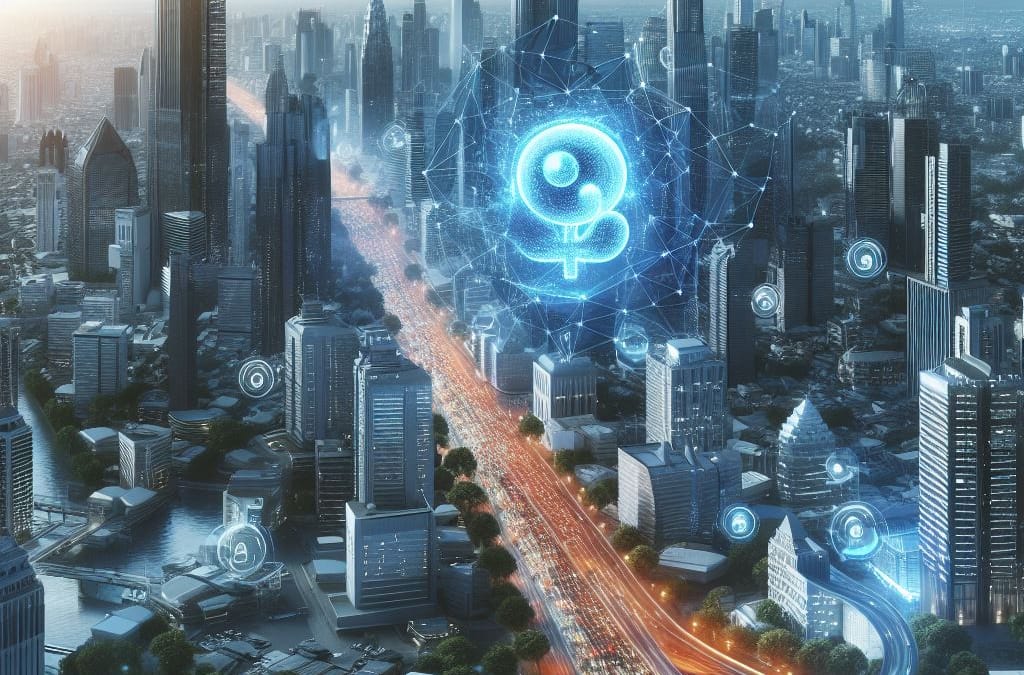Welcome to the future of urban life, where artificial intelligence in smart cities is not just a concept, but a rapidly unfolding reality. As urban centers swell and become more complex, city planners, technology innovators, and forward-thinking citizens are increasingly turning to smart technologies to address the most critical challenges of urbanization. The integration of artificial intelligence into the fabric of smart cities heralds the culmination of this technological evolution.
AI is transforming urban landscapes, optimizing traffic flows, enhancing public safety, and driving sustainability initiatives. Through this in-depth investigation, we will explore in depth how artificial intelligence is revolutionizing the way we live in cities, highlighting in particular the pivotal role of AI-powered, self-driving autonomous vehicles in redefining our concepts of urban mobility and connectivity.
The dawn of smart cities
The idea of smart cities has long captured the imagination of urban planners and technology visionaries alike. For some time now, technologically advanced urban areas have been strategically embracing digital solutions to improve city services and enhance the quality of life for their residents. However, the emergence of artificial intelligence in smart cities has served as a catalyst that has dramatically accelerated the pace of this urban metamorphosis. Artificial intelligence serves as the central nervous system of a smart city, orchestrating a symphony of seamless interactions among disparate components and systems. This integration is critical, paving the way for operations that are not only more efficient but also imbued with superior decision-making capabilities.
With its ability to analyze vast amounts of data and facilitate autonomous solutions, AI enables cities to adapt to the ups and downs of urban life with unprecedented agility. It enables real-time management of critical infrastructure, from transportation systems to energy grids, fostering an environmentally conscious and economically vibrant cityscape. As we continue to embed artificial intelligence deeper into the urban environment, we are witnessing the evolution of cities that think, learn, and respond to the needs of their residents in dynamic new ways. The role of artificial intelligence in smart cities is undeniably transformative, promising a future where technology and human-centered design converge to redefine what it means to live in an urban community.
What makes cities smart?
A smart city is a dynamic ecosystem that harnesses the power of digital technology, including artificial intelligence, to improve the management of assets, resources, and services. The integration of Internet of Things (IoT) sensors, sophisticated data analytics, and automation, all supported by artificial intelligence, enables an unprecedented level of monitoring and control over city functions.
By deploying artificial intelligence in smart cities, these advanced urban landscapes are able to optimize resource consumption, streamline traffic through predictive analytics, improve the quality of public services, and create an environment that is not only more efficient but also significantly more enjoyable for residents. In essence, AI acts as the intelligent core of smart cities, driving innovation and improvement in every facet of urban life.

The role of Artificial Intelligence in Smart Cities
Artificial intelligence serves as the linchpin that brings together the disparate elements of a smart city. With AI, the data collected from sensors is not just raw numbers, but actionable insights. From energy grids that predict and adjust to peak demand, to public safety systems that detect unusual patterns and deploy resources in real time, AI is the driving force behind a smarter urban future.
Traffic Management and AI
The implementation of artificial intelligence in smart cities unlocks a wealth of enhanced capabilities, particularly in the realm of urban transportation and traffic management. AI-driven traffic systems represent an innovative leap forward, utilizing a sophisticated network of street cameras, GPS data, and an array of sensors to meticulously monitor and analyze traffic flow in real time. By harnessing the predictive power of AI, these advanced traffic management systems have the remarkable ability to predict and mitigate traffic congestion before it occurs.
The benefits of such proactive traffic management are many: optimizing traffic patterns reduces overall travel times, facilitates smoother commutes, and significantly reduces environmental impact by reducing vehicle emissions. In addition, the introduction of AI to our roads works to improve public safety by using pattern recognition and predictive analytics to identify potentially dangerous traffic conditions, reducing the likelihood of accidents and improving road safety. Ultimately, the strategic use of artificial intelligence in smart cities serves to create a more streamlined, environmentally conscious, and safer urban transportation network that is a testament to the power of technological innovation in our daily lives.
Improving public safety with artificial intelligence
Artificial intelligence-enabled surveillance systems in smart cities are revolutionizing security measures by identifying irregular activity and incidents in busy public spaces, speeding the response to potential crises. While facial recognition and AI-driven predictive policing are controversial yet formidable tools for maintaining public order, it is imperative that their implementation in the urban landscape be carefully weighed against the need to protect privacy and civil liberties. With careful consideration and ethical oversight, AI can be a force for good, protecting city dwellers while upholding the values of a free and open society.
Revolutionizing Mobility with Cruise Autonomous Vehicles
Artificial intelligence in smart cities is revolutionizing core aspects of urban life, with urban mobility being one of the most critical areas undergoing transformation. The integration of AI is clearly evident in the emergence of self-driving autonomous vehicles (AVs), which are at the forefront of urban transportation innovation. Equipped with an impressive array of advanced sensors, high-resolution cameras, radar, and sophisticated machine learning algorithms, these vehicles are designed to intelligently navigate busy city streets completely independently, minimizing the need for human supervision.
The multifaceted impact of AVs on urban ecosystems is profound and far-reaching. These AI-driven marvels are making a significant contribution to road safety, dramatically reducing the number of car accidents caused by human error. They are also helping to streamline traffic management – autonomous vehicles can communicate with each other and with the transportation infrastructure, adjusting their routes and speeds in real time to maintain optimal traffic flow.
This level of integration can significantly reduce congestion and the environmental impact of idling engines, contributing to cleaner and healthier urban environments.In addition, the deployment of autonomous vehicles promises a paradigm shift in how we use our time while in transit. Commuters once tethered to the steering wheel can now spend their commute time more productively or leisurely, freed from the responsibilities of driving.
This newfound freedom can reshape lifestyles, opening up a wealth of opportunities for remote work, relaxation or social engagement, all while en route to their destinations.Cruise autonomous vehicles are therefore poised to redefine the transportation narrative within smart cities. They offer a radical reimagining of mobility, providing seamless, efficient and safer transportation options that are in sync with the vibrant rhythms of city life.
The urban landscape is on the cusp of a transportation renaissance, where the traditional challenges of distance, time, and safety are addressed with the innovative solutions emerging from artificial intelligence. This transition to AI-powered mobility infrastructure is a beacon of the transformative power and adaptability of artificial intelligence in smart cities, leading us to a future where transportation is not just a means to an end, but a sophisticated, user-centric experience.
Sustainable and efficient transportation
Cruise autonomous vehicles can make a significant contribution to smart city sustainability efforts. With the potential to be electrically powered, these vehicles could drastically reduce greenhouse gas emissions. AI optimization of routes and traffic reduces unnecessary idling and cruising, further contributing to a greener cityscape.
Accessibility and inclusion
The deployment of autonomous vehicles within the context of artificial intelligence in smart cities is ushering in a new era of accessibility that transcends traditional limitations. This advanced integration of AI opens the doors of mobility to everyone, including seniors, people with disabilities, and anyone else for whom driving is not an option. By fostering an environment of inclusivity, AI-enabled smart cities are poised to democratize transportation access and ensure that every citizen benefits from these cutting-edge advancements. It is the embodiment of a future where mobility is not a privilege, but a universal right, enabled by the intelligence of our cities.

Integrating AI into the urban fabric
For smart cities to reach their full potential, AI must be more than an add-on enhancement; it must be intricately woven into the very essence of urban planning and architectural design. It is imperative that the principles of Artificial Intelligence in smart cities underpin every layer of the urban ecosystem, from the foundations of infrastructure development to the detailed intricacies of city services, ensuring that AI is the foundation upon which modern, resilient, and adaptive cities are built.
Intelligent urban infrastructure
Artificial intelligence in smart cities is a key force in dramatically improving the capabilities of urban infrastructure, making our cities not only smarter but also more responsive to the needs of their residents. The integration of AI is transforming our urban landscapes into highly adaptive ecosystems. For example, instead of following a fixed schedule, streetlights will dynamically adjust to real-time pedestrian and vehicle traffic, providing optimal lighting while saving energy.
In addition, AI in smart cities is extending its reach below the streets through advanced water management systems. Smart water pipes equipped with AI-driven sensors proactively detect even the smallest leaks, significantly reducing water waste and preventing small problems from escalating into costly, disruptive disasters.
Beyond these implications, AI is also strengthening urban power grids, enabling them to predict consumption patterns and dynamically allocate resources to ensure stable power distribution even during peak demand. The integration of such smart systems epitomizes how AI is becoming indispensable in orchestrating resilient, efficient, and responsive city infrastructures that are prepared to meet the challenges of the urban future while improving the daily lives of their citizens.
City governance utilizing artificial intelligence.
Smart cities are also benefiting from AI in their governance functions. AI tools analyze large amounts of data to help city officials make informed decisions about urban development, social policy, and resource allocation. Ultimately, these tools can lead to more democratic and transparent governance, provided that ethical considerations and privacy concerns are rigorously addressed.
The future of work in smart cities
As the rise of artificial intelligence transforms the urban realm, the implications for the job market are profound and far-reaching. These burgeoning smart cities are not only hubs of technological innovation, but also crucibles for new career paths in a variety of fields, including engineering, data science, AI system maintenance, and beyond. These sophisticated metropolises are now at the crossroads of a new industrial revolution, where the concept of the smart home is becoming woven into the fabric of the city itself, opening up new opportunities for careers in home automation and intelligent design.
But with this rapid evolution comes a host of challenges. The specter of job displacement looms large as AI-driven automation introduces efficiencies that can outpace human capabilities. In addition, there is a growing need for skills development as traditional roles change and new competencies are required. In this landscape, the gap between the digitally savvy and those without such skills can widen alarmingly, turning the promise of technology into a risk of greater inequality.
Recognizing this, it is paramount that city planners, educational institutions, and industry work closely together. Their collective mission must be to anticipate and proactively address changes in the employment landscape. By creating comprehensive education and training programs that are aligned with the emerging needs of an AI-integrated society, they can ensure that the workforce remains agile, adaptable, and ready to thrive in this new era.
Smart cities, with their blend of artificial intelligence and smart home innovations, have the potential to spark an employment renaissance that will foster not only economic stability, but unprecedented growth. The goal is clear: to foster a symbiotic relationship between human ingenuity and AI, one in which each individual has the opportunity to meaningfully contribute to the evolution of his or her city and to enjoy the fruits of smart, connected urban life. This is the call of our time: to adapt, to evolve, and to give the digital revolution a truly human face.
Challenges and Concerns
The path to AI-enabled smart cities is not without its obstacles. Privacy concerns, cybersecurity, digital inequality, and the ethical use of AI are critical issues that must be addressed. In addition, the widespread adoption of cruising autonomous vehicles presents regulatory and infrastructure challenges that cities must carefully navigate.
Privacy and Security
In the complex landscape where artificial intelligence is a foundational element in smart cities, the importance of securing rich data sets cannot be overstated. These vibrant digital ecosystems, animated by AI, rely on the careful collection and analysis of data to improve the functionality and livability of urban environments. However, this same reliance presents a significant risk if the integrity and privacy of this information is not carefully protected. Protecting against breaches and misuse is paramount to fostering and maintaining public trust in the expanding framework of smart city operations.
Practical steps toward achieving this trust include implementing sophisticated cybersecurity measures and fostering a culture of transparency in data management. Strict adherence to such protocols isn’t just about maintaining a secure network; it’s about ensuring that the dynamic fusion of artificial intelligence in smart cities serves as a boon to the urban experience-optimizing daily life and empowering citizens without ever compromising their personal privacy or collective security. It’s about finding a balance where AI can be used to streamline city operations, improve public services, and foster communities, while keeping the digital backbone of our cities robust, secure, and ethically impenetrable.
Bridging the Digital Divide and Promoting Equity in the Age of Artificial Intelligence in Smart Cities
In the age of artificial intelligence in smart cities, bridging the digital divide is more than a challenge-it’s an ethical imperative. As we stand on the cusp of a technological revolution, the promise of AI-driven cities brimming with efficiency and innovation stands in stark contrast to the risk of deepening existing social divides. To counter this, proactive measures are essential to ensure equitable access to the myriad benefits of AI.
Smart city initiatives must be designed with a commitment to inclusivity, ensuring that advances in AI not only meet the needs of a diverse population but also actively empower all segments of society. Digital infrastructure should be accessible and user-friendly, providing training and support that enables all citizens to navigate, contribute to, and benefit from the smart ecosystems that shape their daily lives.
With such thoughtful planning and policymaking, smart cities can offer more than technological marvels – they can deliver on the promise of fostering communities where progress and prosperity are shared, and where every individual can thrive in the dazzling new world created by the hands of artificial intelligence.
Ethical considerations
AI systems, including those in autonomous vehicles, must be programmed to make ethical decisions, especially in scenarios where such decisions have significant consequences. Establishing clear guidelines and regulations for the development and deployment of AI technologies is critical to their ethical integration into society.
Conclusion
The integration of artificial intelligence into smart cities marks not just technological progress, but a complete reenvisioning of urban existence. The advent of AI promises urban centers that are safer, more productive, and eco-friendly, catering to the diverse needs of every inhabitant. With cruise autonomous vehicles leading the charge, we are entering an era where transportation becomes seamlessly automated and infused with intelligence.
For stakeholders involved in the journey towards more intelligent cities, it is essential to seize these opportunities while diligently addressing the accompanying challenges. As we embark on this transformative path with measured optimism, we are poised to craft a future that harnesses the full potential of artificial intelligence in smart cities, embodying the finest aspects of innovation and the human spirit.
Embarking on the journey to build and live in smart cities infused with artificial intelligence is an exciting prospect that has the power to transform our urban environments into hubs of efficiency, innovation, and prosperity. As we embrace these changes, let’s be mindful of our shared responsibility to do so sustainably and inclusively, and to ensure that the benefits of such cities are accessible to all. The road ahead is full of promise, and with careful planning and ethical practices, smart cities with artificial intelligence will lead us into a brighter, more connected future.


Recent Comments